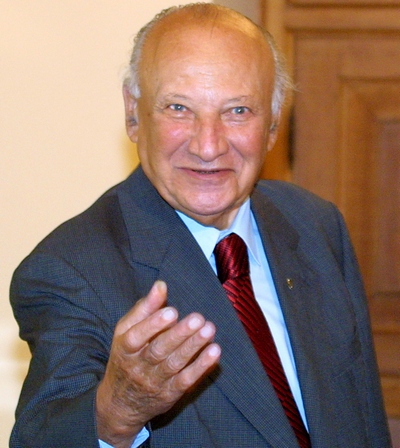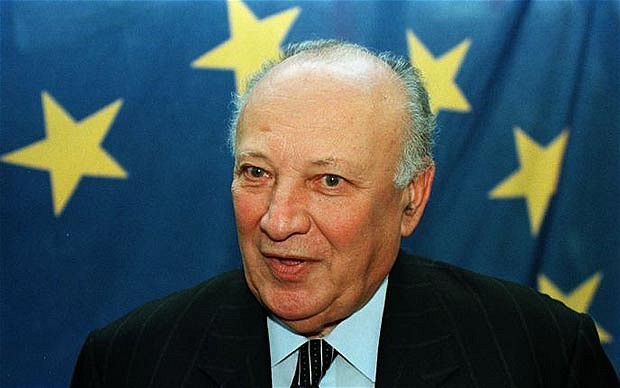Glafcos Clerides (Glafcos Clerides)

Clerides was born and died in Nicosia. He was the eldest son of the lawyer and statesman Ioannis Clerides. Clerides was married to Lila-Irene. They have a daughter, Katherine, who is a member of the House of the Representatives for the Democratic Rally Party. During World War II, he served in the British Royal Air Force. In 1942 his airplane was shot down over Germany and he was captured. He remained a prisoner of war until the end of the war. His name was mentioned in dispatches for distinguished services. Following the war, he studied law at King’s College London graduating in 1948, and later practiced law in Cyprus. He was a member of the EOKA organization that sought the liberation of Cyprus from British Rule and participated in the struggle under the pseudonym “Ypereides.” During that period he defended numerous EOKA fighters arrested by the British. One of his most famous accomplishments was a preparation of a dossier that enumerated and provided evidence of instances of Human Rights violations by the Imperial administration of Cyprus and its agents. Clerides participated in the 1959 London Conference on Cyprus and during the transitional period, from colonial administration to independence (1959–1960), he served as Minister of Justice. During the same period he was Head of the Greek Cypriot delegation in the Joint Constitutional Committee. In July 1960, he was elected to the House of Representatives which, in turn, elected him as its first President. He held this position until 22 July 1976. In the first presidential elections Clerides backed Makarios III, the other candidate being his father Ioannis Clerides.
Cyprus became independent in 1960, and Clerides gained political power as a member of the United Democratic Party. Following the 15 July 1974 coup d’état in which EOKA B, a Greek Cypriot pro-enosis paramilitary organisation, overthrew the democratically elected Makarios and installed Nikos Sampson as a President with dictatorial powers, Turkey invaded Cyprus. Eight days later, Sampson was forced to resign. On the same day, 23 July 1974, Clerides temporarily assumed the duties of the President of the Republic, in accordance with the relevant provisions of the Constitution. He exercised these duties until the 7 December 1974, the day of the return of Archbishop Makarios, President of the Republic, who was forced to flee on 16 July 1974 on account of the coup. Both President Makarios and the House of Representatives thanked Glafcos Clerides publicly for the task he performed during that period. Critics, especially from EDEK refer to that period as the post-coup, implying that democracy was not fully restored until the return of Makarios. Clerides on the other hand has repeatedly condemned what he called “violence and counter violence” that lead to the coup (i.e. the conflict between Grivas’s EOKA-B and “efedriko”, a special anti-terrorist police body formed to fight EOKA-B).
From 1961 to 1963 he held the position of President of the Cyprus Red Cross. In recognition of his outstanding services he was awarded a Certificate of Honour and Life Membership in recognition of distinguished services to the Red Cross. In 1976 he founded the right wing Democratic Rally (Demokratikos Synagermos). He was a candidate for the presidency of Cyprus six times and elected to two five-year terms, in 1993 and in 1998. In 1998 his main opponent was Georgios Iakovou. He was defeated in the 2003 presidential election by Tassos Papadopoulos. He was the author of the autobiographical overtoned depiction of 20th century Cypriot history, My Deposition, in four volumes. Glafcos Clerides is an Honorary Member of The International Raoul Wallenberg Foundation.
During his presidency (1993–2003) Cyprus prospered significantly. Its stabilised economy made Cyprus the wealthiest of the ten inductees to the European Union in 2004. The Clerides administration is heavily credited with the ascension to the European Union. Clerides, with his Churchillian persona, was respected by world leaders at the time of his presidency, and was locally a respected leader because of his accomplishments. He lost some of this popularity due to his strong support of Annan Plan for the unification of Cyprus. While 65% of the Turkish Cypriot community voted in favor of the plan in a referendum, the Greek Cypriot community rejected it by over 75% of the popular vote.
Born
- April, 24, 1919
- Nicosia, Cyprus
Died
- November, 15, 2013
- Nicosia, Cyprus



